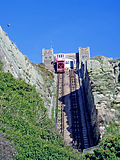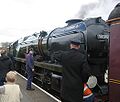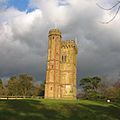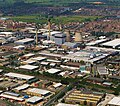Portal:South East England
The South East England Portal

South East England is one of the nine official regions of England that are in the top level category for statistical purposes. It consists of the nine counties of Berkshire, Buckinghamshire, East Sussex, Hampshire, the Isle of Wight, Kent, Oxfordshire, Surrey and West Sussex. South East England is the third-largest region of England, with a land area of 19,072 square kilometres (7,364 sq mi), and is also the most populous with a total population of 9,379,833 in 2022.
South East England contains eight legally chartered cities: Brighton and Hove, Canterbury, Chichester, Milton Keynes, Oxford, Portsmouth, Southampton and Winchester. Officially it does not include London, which is a separate region. The geographical term for "South East England" may differ from the official definition of the region, for example London, Bedfordshire, Hertfordshire and Essex are sometimes referred to as being in the south east of England. This article only considers the South East as being the official statistical region.
In medieval times, South East England included much of the Kingdom of Wessex, which was the precursor to the modern state of England. Winchester was the capital of England after unification of the various states, including the kingdoms of Kent, Sussex and Mercia. Winchester stopped being the administrative capital of England some time in the 13th century as its influence waned while the City of London dominated commerce. The last monarch to be crowned at Winchester was Richard II in 1377, although the last monarch to be crowned by the Bishop of Winchester was Queen Mary I in 1553.
Today, the region's close proximity to London has led to South East England becoming a prosperous economic hub with the largest economy of any region in the UK, after London. The region is home to Gatwick Airport and Heathrow Airport (the UK's two busiest airports). The coastline along the English Channel provides numerous ferry crossings to mainland Europe. South East England is also known for its countryside, which includes two national parks: the New Forest and the South Downs, as well as the North Downs, the Chiltern Hills and part of the Cotswolds. The River Thames flows through the region and its basin is known as the Thames Valley.
It is also the location of a number of internationally known places of interest, such as HMS Victory in Portsmouth, Cliveden in Buckinghamshire, Thorpe Park and RHS Wisley in Surrey, Blenheim Palace in Oxfordshire, Windsor Castle in Berkshire, Leeds Castle, the White Cliffs of Dover and Canterbury Cathedral in Kent, Brighton Palace Pier, and Hammerwood Park in East Sussex, and Wakehurst Place in West Sussex. The region has many universities; the University of Oxford is the oldest in the English-speaking world, and ranked among the best in the world.
South East England is host to various sporting events, including the annual Henley Royal Regatta, Royal Ascot and The Derby, and sporting venues include Wentworth Golf Club and Brands Hatch. Some of the events of the 2012 Summer Olympics were held in the south east, including the rowing at Eton Dorney and part of the cycling road race in the Surrey Hills. (Full article...)
Selected article
The Brighton Palace Pier, commonly known as Brighton Pier or the Palace Pier, is a Grade II* listed pleasure pier in Brighton, England, located in the city centre opposite the Old Steine. Established in 1899, it was the third pier to be constructed in Brighton after the Royal Suspension Chain Pier and the West Pier, but is now the only one still in operation. It is managed and operated by the Eclectic Bar Group.
The Palace Pier was intended as a replacement for the Chain Pier, which collapsed in 1896 during construction of the new pier. It quickly became popular, and had become a frequently-visited theatre and entertainment venue by 1911. Aside from closures owing to war, it continued to hold regular entertainment up to the 1970s. The theatre was damaged in 1973 and following a buy-out was demolished in 1986, changing the pier's character from seaside entertainment to an amusement park, with various fairground rides and roller coasters.
The pier remains popular with the public, with over four million visitors in 2016, and has been featured in many works of British culture, including the gangster thriller Brighton Rock, the comedy Carry On at Your Convenience and the Who's concept album and film Quadrophenia. (Full article...)
Selected pictures
Selected biography
Joseph Rudyard Kipling (/ˈrʌdjərd/ RUD-yərd; 30 December 1865 – 18 January 1936) was an English journalist, novelist, poet, and short-story writer. He was born in British India, which inspired much of his work.
Kipling's works of fiction include the Jungle Book duology (The Jungle Book, 1894; The Second Jungle Book, 1895), Kim (1901), the Just So Stories (1902) and many short stories, including "The Man Who Would Be King" (1888). His poems include "Mandalay" (1890), "Gunga Din" (1890), "The Gods of the Copybook Headings" (1919), "The White Man's Burden" (1899), and "If—" (1910). He is seen as an innovator in the art of the short story. His children's books are classics; one critic noted "a versatile and luminous narrative gift".
Kipling in the late 19th and early 20th centuries was among the United Kingdom's most popular writers. Henry James said "Kipling strikes me personally as the most complete man of genius, as distinct from fine intelligence, that I have ever known." In 1907, he was awarded the Nobel Prize in Literature, as the first English-language writer to receive the prize, and at 41, its youngest recipient to date. He was also sounded out for the British Poet Laureateship and several times for a knighthood, but declined both. Following his death in 1936, his ashes were interred at Poets' Corner, part of the South Transept of Westminster Abbey.
Kipling's subsequent reputation has changed with the political and social climate of the age. The contrasting views of him continued for much of the 20th century. Literary critic Douglas Kerr wrote: "[Kipling] is still an author who can inspire passionate disagreement and his place in literary and cultural history is far from settled. But as the age of the European empires recedes, he is recognised as an incomparable, if controversial, interpreter of how empire was experienced. That, and an increasing recognition of his extraordinary narrative gifts, make him a force to be reckoned with." (Full article...)
On This Day in South East England
10 May:
1940: Oxfordshire-born Sir Winston Churchill became Prime Minister of the United Kingdom.
Categories
Related portals
WikiProjects
Topics
Associated Wikimedia
The following Wikimedia Foundation sister projects provide more on this subject:
- Commons
Free media repository - Wikibooks
Free textbooks and manuals - Wikidata
Free knowledge base - Wikinews
Free-content news - Wikiquote
Collection of quotations - Wikisource
Free-content library - Wikiversity
Free learning tools - Wikivoyage
Free travel guide - Wiktionary
Dictionary and thesaurus































































































































